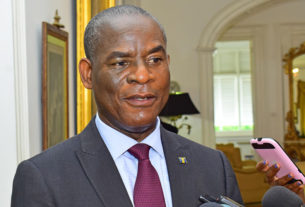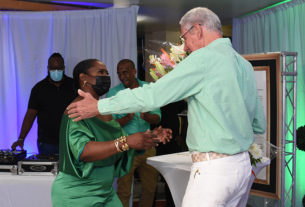Emancipation memorials honouring our freedom fighters
Jul 23, 2020 Department of Social Cohesion, Features, Government, Ministry of the Presidency
Gavin Lewis Author Communications Officer | Department of Public Information email gavin.lewis@dpi.gov.gy follow me
-9 days to Emancipation Day
DPI, Guyana, Thursday, July 23, 2020
August 1, 1838 – Emancipation Day – one of the most important days in the history of Guyana is observed annually in recognition of the courageous efforts and sacrifices of men and women of African descent in the fight for their freedom and that of their descendants.
Several monuments have been built, across the country, as reminders to those who came after, to value what was fought for.
The most well-known is the 1763 Monument that immortalises the Berbice Slave Rebellion in 1763 – a noteworthy turning point in our nation’s struggle for freedom. That rebellion of more than 2,500 slaves was led by ‘Cuffy’ who was of West African descent.
Cuffy’s year-long fight for liberation was undone by the enslaving colonies (British, French and Dutch). Despite his defeat, Cuffy became a national hero of Guyana, and a symbol for the fight against colonialism.
The bronze sculpture stands at 15 feet tall in the Square of Revolution and was unveiled on May 23, 1976, to mark Guyana’s tenth anniversary as an independent nation. It was sculpted by the renowned Philip Moore, who passed away in 2012.
Another freedom fighter who has been honoured in bronze is ‘Damon’ an African labourer who rallied about 700 freed slaves’ to protest the 1834 apprenticeship system.
The scheme which mandated labourers to continue working on the plantations even after the Emancipation Act was passed in 1833 was viewed as another form of slavery.
Damon was later executed on October 13, 1843, for his role in the protest.



Located in Anna Regina, the Damon Monument was unveiled by the Regional Democratic Council of Region 2 on July 31, 1988. The nine-foot-tall bronze memorial which weighs three tons and rests on a concrete plinth was created by United States-based Guyanese sculptor, Ivor Thom.



The 1823 Emancipation Monument situated along the Seawall Road which was unveiled in 2013, pays tribute to the fallen heroes of the largest slave revolt in our nation’s history – the 1823 Demerara Revolt.
This notable uprising saw the involvement of over 10,000 slaves, and is believed to have hastened the decision for Emancipation. The 1823 Emancipation Monument was also designed by Ivor Thom.
Another significant event in our nation’s history is forever memorialised in the Beterverwagting Emancipation Monument which honours the 62 freed Africans who purchased the village in 1840 for a sum of $52,000.
This structure depicts a hand with a broken chain, holding aloft a book, which represents the registered title to the property in which the village was founded.
There are several other memorials to commemorate Guyana’s struggle for freedom.
Among them are the Friendship Emancipation Monument, the Plaisance Independence Monument, Ann’s Grove and Two Friends Centenary Monument, the Kildonan Independence Monument, the Litchfield Centenary Monument, the Victoria Emancipation Monument and the Nabaclis 150th Anniversary Monument.




